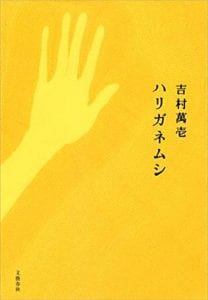Yoshimura Man’ichi 吉村萬壱. Hariganemushi ハリガネムシ. Bungei Shunjû, 2003.
Co-winner of the 129th Akutagawa Prize, for the first half of 2003.
A high-school teacher gets involved with a prostitute from a soapland, and their unhealthy codependency ends with him almost beating her to death, and then, later, her almost killing him.
It’s a really puzzling book, and I don’t feel like going much more into the details of the plot than that. A hariganemushi (a nematomorph?) by the way, is a kind of worm that’s a parasite in bugs; he finds one in a praying mantis he kills. The metaphor is probably that either the girl’s a parasite on him or the other way around; combine that with the fact that the worm supposedly screws up the insect’s reproductive system, and you get a sexual element to the parasitism, which is certainly there in the book. Beating her up turns him on, something that becomes more and more clear to him as the book goes on.
There are elements of class involved: she’s from a really trashy background, poor, and there’s an implication, either in the narrator’s mind or the author’s, can’t tell, that she’ll never change, she gets involved with dangerous people like the narrator because at root that’s who she is, and she can’t (or doesn’t believe she can) do any better. From the point of view of the narrator, she’s a disposable person. And it’s this, precisely, that gets the narrator off—he’s aroused by the fact that he can beat her and she’ll come back.
So I guess you could say the book is trying to depict a dangerously codependent relationship. It has pieces that don’t fit, however, like why it’s so insistently set in 1987, and why we hardly learn anything at all about the narrator’s mental state that would explain the things he does. Half the book is a road trip to her hometown in Shikoku, and along the way he proposes to her, and we think it might be because she has kids in an institution and he feels sorry for her, but then he beats her up—in short the narrator usually just describes, doesn’t comment, even though it’s his own life. Maybe that’s the point—he’s an inveterate journal writer, although what we’re reading isn’t that—maybe we’re supposed to notice his passivity in his own life? Maybe it’s an anti-shishôsetsu, a first-person narrative that refuses to get inside the narrator’s head? And yet it’s not exactly like he’s an unreliable narrator. Just a detached one.
Mostly it’s the tone that’s disturbing. There’s a moral ambiguity in the author’s refusal to make the narrator’s voice more unsympathetic—the book made me really uncomfortable, and not in a “this is challenging my preconceptions—it’s Art” kind of way. Just made me feel gross.
Well written. But I don’t know why it got the Prize (which, of course, could have been due to factors having nothing to do with what I’ve written here).
Note: all of the above I wrote right after I read the book, back in July. Now, posting this, I find that the book is still there in my head, pretty vividly. That says something; not sure what. Probably that what I said at the end about it being well written is true: a really vividly expressed, cunningly constructed book. It stays with you, and not necessarily just the lurid parts. As a portrait of an unhealthy relationship, it’s brilliant. I still don’t know what to do with the tone, though.
